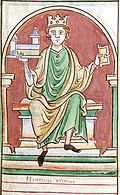Wikipedia:Today's featured article/August 5, 2015
Henry I (c. 1068 – 1135) was King of England from 1100 to 1135. After his father, William the Conqueror, died in 1087, Henry's older brothers Robert and William Rufus inherited Normandy and England, respectively, while Henry was landless. He seized the English throne after William Rufus's death in 1100, and Robert invaded England to claim it. A settlement between the two confirmed Henry as king, but it was short-lived; Henry invaded Normandy and defeated Robert. Henry's control of Normandy was challenged by William Clito, Robert's son, and a rebellion resulted. Peace only came after Henry's victory at the Battle of Bremule. Considered by contemporaries to be a harsh but effective ruler, Henry drew on the existing Anglo-Saxon system of justice in England and added the exchequer and judges. Normandy was increasingly governed in the same manner. He encouraged the ecclesiastical reforms initiated by Pope Gregory VII, but became involved in a dispute with Archbishop Anselm of Canterbury. Henry's only legitimate son, William Adelin, drowned in the White Ship disaster, causing a succession crisis. Henry declared his daughter, Matilda, as his heir and married her to Geoffrey Plantagenet. After his death, however, Henry was succeeded by his nephew, Stephen, resulting in a civil war known as the Anarchy. (Full article...)

